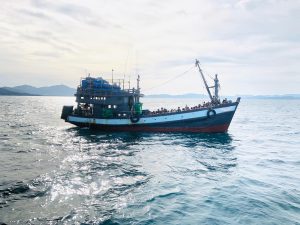Rohingya Muslims fleeing persecution from Myanmar have been left stranded at sea on the Bay of Bengal following a decision by Bangladesh to refuse to bring them ashore. Rohingya refugees were trying to make their way to Malaysia; however, the country’s restrictions on receiving any boats in light of the coronavirus pandemic left them in the Bay of Bengal. Now the nearest country, Bangladesh, is likewise leaving them deserted.
There are approximately 500 Rohingyas, including many women and children, stranded on two trawlers, risking starvation and in need of urgent medical assistance after having been left at sea for weeks. According to the United Nations refugee agency, UNHCR, Rohingya refugees at sea have no access to adequate food or water, leaving them in an unacceptable plight.
Bangladesh’s Foreign Minister Abdul Momen said, “I am opposed to allowing these Rohingya into the country because Bangladesh is always asked to take care of the responsibility of other countries.” He further added, “We have no room to shelter any foreign people or refugees.” In addition, the Bangladesh government has even denied the fact that these trawlers full of Rohingyas exist, in a bid to try to shirk further responsibility.
Prime Minister Sheikh Hasina, who has been viewed positively in previous years for offering protection to Rohingya refugees fleeing Myanmar, is now turning her back on the same refugees she once helped. Bangladesh must continue to fulfill its international obligations not to return refugees back to Myanmar, where they face persecution, and ensure that they are not at risk of torture or other ill-treatment. In addition, other countries in close proximity such as Malaysia and Thailand have the responsibility under international law to ensure that boats carrying refugees are brought to safety.
There needs to be a strategic rescue operation for those whose lives are at risk while fleeing persecution in their home countries. This situation calls for Bangladesh to act immediately — or face blood on their hands.
The coronavirus pandemic cannot be used as an excuse to justify a blanket policy that refuses to allow any Rohingyas to disembark on the shores of Bangladesh, thus forcing them to face death at sea. Not only is this inhumane, but it is a clear violation of international law. Human Rights Watch notes that “Under international law, public health measures taken in response to the Covid-19 pandemic must be proportionate, nondiscriminatory, and based on available scientific evidence.” If it is the COVID-19 pandemic that Bangladesh is concerned about, what is stopping the government from quarantining the refugees and enabling their rights to food, water, and shelter?
In early April, Bangladesh coast guard officials had rescued one boat of Rohingya refugees, which had reportedly been turned away by Malaysia nearly two months earlier. Heartbreakingly, 390 Rohingya were found starving; many of them were under 20 years old. As many as 100 Rohingyas may have died on board before the rescue operation. Now we have over 500 Rohingya refugees at sea and cannot be sure of how many of them have already died after being stranded for weeks. Bangladesh should help to bring these two boats ashore instead of taking a dismissive stance by listing how they have previously helped. All their past positive efforts will be tainted by the decision to let more than 500 refugees die at sea without intervention.
The Bangladeshi government claims that they have no further responsibility to take more Rohingya refugees, but by failing to allow Rohingyas to disembark in their country they are failing humanity.
For years, the Rohingyas have been subjected to unprecedented violations of human rights by the Myanmar government, which shoulders the responsibility for the current Rohingya refugee crisis. Approximately 900,000 Rohingyas are currently living in overcrowded camps in Bangladesh after fleeing genocide and crimes committed by Myanmar military.
Bangladesh must seek counsel with other neighboring countries to gain financial assistance and a strategy for assisting those at risk. Other countries such as Malaysia and Thailand must be prepared to also accept refugees, who have risked their lives to live in peace.
I have been covering the plight of Rohingya for years and while I appreciate the fact that Bangladesh is already host to nearly a million Rohingya refugees who fled mass atrocities in Myanmar, they are still obliged give current and future refugees the safe sanctuary they deserve and uphold their human rights.
Tasnim Nazeer is an award-winning journalist and author who has written for a variety of print and online publications including The Guardian, Al Jazeera English, CNN, HuffPost UK and many more.

































